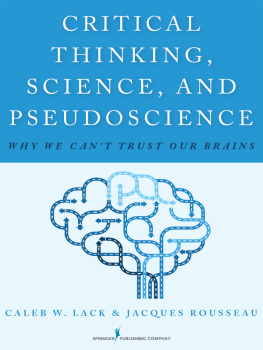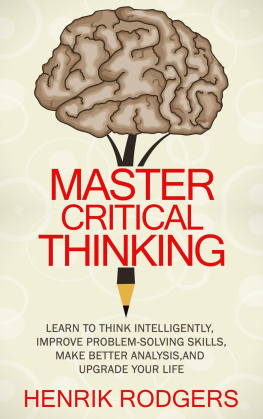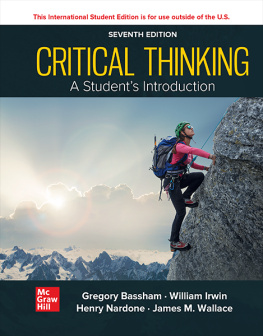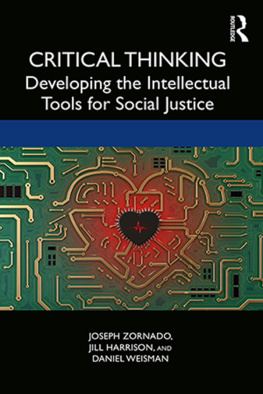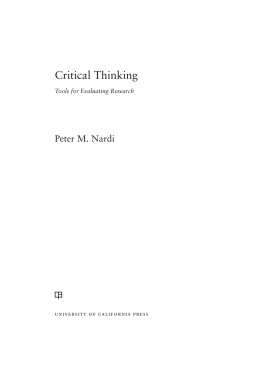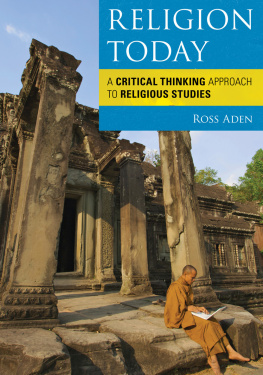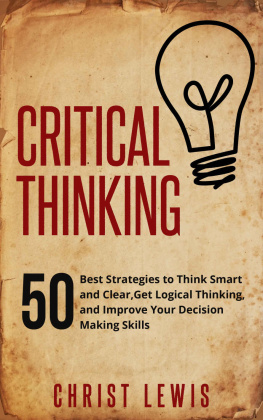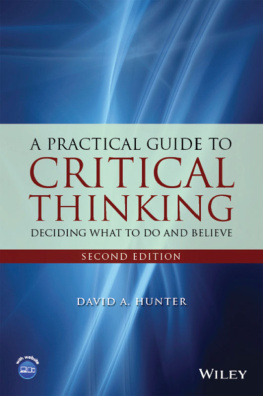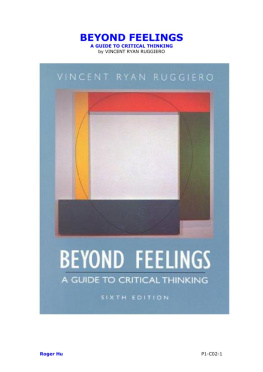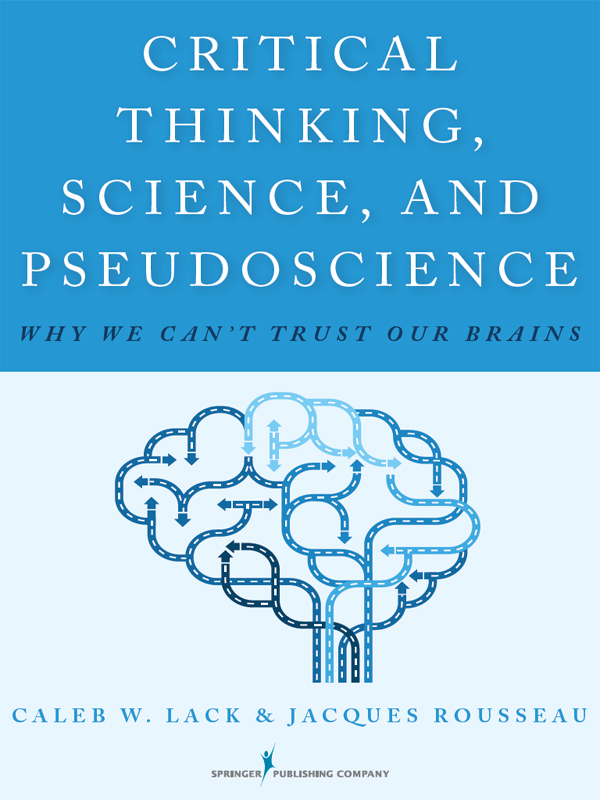CRITICAL THINKING, SCIENCE, AND PSEUDOSCIENCE
Caleb W. Lack, PhD, is an associate professor of psychology at the University of Central Oklahoma. He is the author or editor of five prior books: Tornadoes, Children, and Posttraumatic Stress; Anxiety Disorders: An Introduction; Mood Disorders: An Introduction; Psychology Gone Astray; and Obsessive-Compulsive Disorder: Etiology, Phenomenology, & Treatment. In addition, he has authored over 40 peer-reviewed journal articles and book chapters. He received his doctorate in clinical psychology from Oklahoma State University and has won numerous awards for his innovative teaching and research. Outside of the realm of clinical psychology, he also teaches undergraduate and graduate courses on critical thinking, science, and pseudoscience. He writes the "Great Plains Skeptic" column on the Skeptic Ink Network and presents frequently on how to think critically about paranormal and supernatural claims. You can learn more by visiting his website at www.caleblack.com.
Jacques A. Rousseau, MA, is currently a lecturer in the School of Management Studies at the University of Cape Town (UCT). He studied philosophy and English at UCT between 1992 and 1996, before beginning an academic career that has involved teaching multiple courses in critical thinking, business ethics, moral philosophy, and sociology. His primary research areas involve epistemic standards in journalism and public media, addiction, critical thinking, and religious conflict. He sits on various governance bodies at UCT, including its Council, and is the chair of the Academic Freedom Committee. In 2009, he founded (and currently chairs) the Free Society Institute, a nonprofit organization dedicated to promoting free thought, free speech, secular humanism, and scientific reasoning. You can learn more by visiting his website at www.jacquesrousseau.com.
CRITICAL THINKING, SCIENCE, AND PSEUDOSCIENCE
Why We Cant Trust Our Brains
Caleb W. Lack, PhD
Jacques Rousseau, MA

Copyright 2016 Springer Publishing Company, LLC
All rights reserved.
No part of this publication may be reproduced, stored in a retrieval system, or transmitted in any form or by any means, electronic, mechanical, photocopying, recording, or otherwise, without the prior permission of Springer Publishing Company, LLC, or authorization through payment of the appropriate fees to the Copyright Clearance Center, Inc., 222 Rosewood Drive, Danvers, MA 01923, 978-750-8400, fax 978-646-8600, .
Springer Publishing Company, LLC
11 West 42nd Street
New York, NY 10036
www.springerpub.com
Acquisitions Editor: Nancy Hale
Composition: diacriTech
ISBN: 978-0-8261-9419-0
e-book ISBN: 978-0-8261-9426-8
Instructors Materials: Qualified instructors may request supplements by e-mailing :
Instructors Manual ISBN: 978-0-8261-9432-9
PowerPoint ISBN: 978-0-8261-9438-9
16 17 18 19 20 / 5 4 3 2 1
The author and the publisher of this Work have made every effort to use sources believed to be reliable to provide information that is accurate and compatible with the standards generally accepted at the time of publication. The author and publisher shall not be liable for any special, consequential, or exemplary damages resulting, in whole or in part, from the readers use of, or reliance on, the information contained in this book. The publisher has no responsibility for the persistence or accuracy of URLs for external or third-party Internet websites referred to in this publication and does not guarantee that any content on such websites is, or will remain, accurate or appropriate.
Library of Congress Cataloging-in-Publication Data
Names: Lack, Caleb W., 1978- , author. | Rousseau, Jacques (Jacques Andr), 1971- , author.
Title: Critical thinking, science, and pseudoscience : why we cant trust our brains / Caleb W. Lack, Jacques Rousseau.
Description: New York, NY : Springer Publishing Company, LLC, [2016] | Includes bibliographical references and index.
Identifiers: LCCN 2015040040 | ISBN 9780826194190 | ISBN 9780826194268 (e-book)
Subjects: | MESH: Thinking. | Health Knowledge, Attitudes, Practice. | Religion and Science.
Classification: LCC BF441 | NLM BF 441 | DDC 153.4/2--dc23 LC record available at http://lccn.loc.gov/2015040040
Special discounts on bulk quantities of our books are available to corporations, professional associations, pharmaceutical companies, health care organizations, and other qualifying groups. If you are interested in a custom book, including chapters from more than one of our titles, we can provide that service as well.
For details, please contact:
Special Sales Department, Springer Publishing Company, LLC
11 West 42nd Street, 15th Floor, New York, NY 10036-8002
Phone: 877-687-7476 or 212-431-4370; Fax: 212-941-7842
E-mail:
Printed in the United States of America by Bradford and Bigelow.
For my son, Lucian. I hope that the world you grow up in contains at least a few more critical thinkers in it because of our work.
CWL
To my father, Jacques Rossouwa model of scientific integrity and a lifelong inspiration for careful and critical thinking. Thank you.
JR
CONTENTS
by Eugenie C. Scott, PhD
by Scott Lilienfeld, PhD
CONTENTS
Guide
FOREWORD: BRAINS, HEARTS, GUTS, AND GENITALS
Ask an actor, How do you connect with an audience? and youre likely to hear that he or she will aim at an audience on four levels. An actor can appeal to the intellect, to emotions, to instinct, or, shall we say genteelly, to animal urges. In other words, brains, hearts, guts, and genitals.
Guess which will be the first choice?
Right. The farther down the body you go, the easier, quicker, and more effective is the connection to an audience. You can see this in magazine advertising or on Internet social media. Click-bait focuses heavily on guts and genitalsand all those cute cat and puppy videos are an appeal to the heart. You dont see a lot of click bait appealing to brains. Twitter and YouTube are not the first places you turn to for logical, intellectual discourse.
So why did the authors of this book focus at the top of the list, rather than somewhere lower down?
Because even though the downward end of the scale of brains, hearts, guts, and genitals works in acting, YouTube posts, advertising, and other forms of communication, its not necessarily how you want to live your life. As the starring actor in your own lifes drama, you are going to be much better off if you focus on the top of that scale for most of the decisions in your life.
Its not going out on a limb to say that you really should start at the top when its a big decision. If you know how to use your brain to think critically about the world around you, most of the time youre going to come out ahead. Arguably, relying on the topmost anatomical features (head and heart) will get you farther than guts and genitals.
Im not proposing that you give up heart, guts, and genitals; youre not likely to comply, and really, its not necessary anyhow. If youre walking to class or work, say, and you put in your earbuds to listen to some music, youre not likely to need to employ a lot of the critical thinking skills so usefully outlined in this book: youre going to choose your selections depending on how you feel. Are you feeling really mellow? Are you feeling

